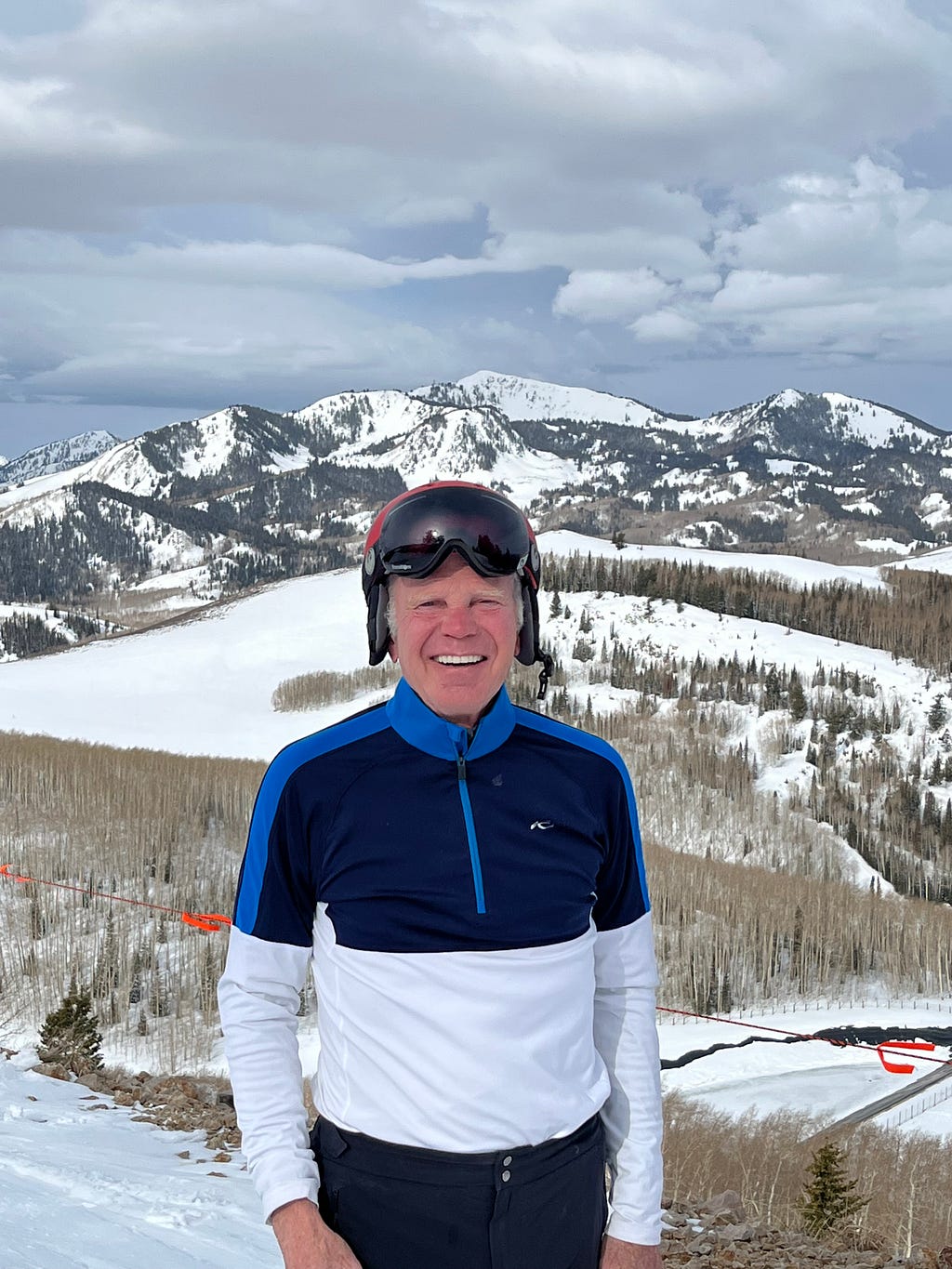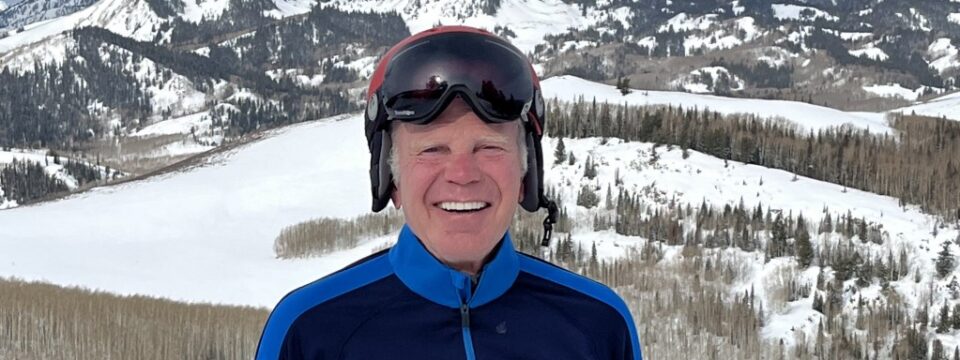
Leaders frame public discourse. They speak to truth, raising awareness and understanding, even when doing so imperils them. They have to point the way so we can believe and join them.. That’s how they earn our trust, and our vote.
As part of my series about “authors who are making an important social impact”, I had the pleasure of interviewing Jim Doilney.
Jim Doilney is one of the fittest seniors you’ll ever meet. He’s also a PhD in Economics, a former university professor, builder of innovative LEED-certified communities, successful retailer, sometimes visionary entrepreneur, and a persistent off-path explorer of remote places and ideas. He has lived, played, and worked in the resort town of Park City, Utah, for nearly 50 years, where he continues his quest for answers to prostate cancer. He is also the author of “Riding the Scalpel,” the incredible 20-year saga of a globe-trotting adventure traveler who rode for his life. Beyond this book, he also established the Riding The Scalpel Foundation, a nonprofit organization.
Long before he became an adventure traveler and medical renegade, Jim was thinking big ideas. As early as 1972, he published an award-winning article about the catastrophic effects of unbridled capitalism on climate change. His 1974 dissertation while sponsored by the National Science Foundation was a precursor for today’s conversations about intergenerational equity and the legacies we will leave for our children. And somewhere along the way, he found time to design and build a million-dollar sun calendar — one of the few in the world — you can still see in Park City today.
Thank you so much for joining us in this interview series! Before we dive into the main focus of our interview, our readers would love to “get to know you” a bit better. Can you tell us a bit about your childhood backstory?
My earliest memory comes from when I was two years, three months and six days old, March 14, 1950, the day my parents brought home my four day old sister. I am not the center of the world. Over time that shock taught me the 10 two letter words I’ve lived by: IF IT IS TO BE IT IS UP TO ME.
When you were younger, was there a book that you read that inspired you to take action or changed your life? Can you share a story about that?
James Thurber’s short story, “The Secret Life of Walter Mitty”, guided my approach to life. . Just let go!…think of doing things we wouldn’t normally think of doing…that was a direct lead to my adventure travels
Can you share the funniest or most interesting mistake that occurred to you in the course of your career? What lesson or take away did you learn from that?
I was an environmentalist….to a fault. I once built six townhomes that heated and cooled themselves with no moving parts. I turned dollars into dimes until I ran out of dollars, building what I thought people should want. Going broke taught me to listen. I got rich when I started giving people what they wanted!
Can you describe how you aim to make a significant social impact with your book “Riding The Scalpel”?
Save 150,000 men a year from being blindly baked, butchered and burned by likely needless prostate cancer treatments.
Can you share with us the most interesting story that you shared in your book?
People talk most about Cotopaxi. It’s an active volcano in Ecuador that me and a couple of buddies decided we wanted to ski. Of course, if you want to ski down a volcano, first you have to climb it. It’s over 19,000 feet of fog, sleet, ice and snow. We had a lot of trouble from altitude sickness and dehydration. It took us almost 3 days to make the climb, and we reach the peak at sunrise, after climbing all night. The views are spectacular as the rising sun lights up the ice-capped peaks all around us, and the Pacific Ocean almost 100 miles to the west. We have to ski at dawn, before the sun turns the snow to slush. We ski cautiously, always one in front and one behind. A slip here means a long tumbling fall into rocks or a crevasse. About two-thirds of the way down, we’re suddenly in dense fog. We can’t see each other so we keep calling out. At one point I’m stopped on a ledge and I have no idea what is below me. One of my buddies is somewhere below and tells me to step of into a sharp left turn, then one more turn to where he is waiting. I go on blind faith, make the turns and stop when he grabs me. Ten minutes late we have skiied down to the hut. People there are waiting for the fog to lift so they can climb. They look at our skis in amazement and tell us no one can remember anyone ever skiing down the volcano before. So 35 years ago, we were the first.
What was the “aha moment” or series of events that made you decide to bring your message to the greater world? Can you share a story about that?
There was no single moment. It was more like 20 years of anger, when I knew hundreds of thousands of men’s lives were being needlessly devastated by a medical system that failed to give them the information and choices that were
already there. I knew there had to be a better way and I found it. I decided I had to find a way to tell them…and this book is the beginning.
Are there three things the community/society/politicians can do to help you address the root of the problem you are trying to solve?
The problem is how the Medical Industrial Complex works.
New treatments and technology have to run a gauntlet of opposition from vested interests — -whether it’s big Pharma, the AMA or even our own FDA. There are drugs and treatments that have been saving lives for 20 years in Europe ,or even 10 years in Canada, that we cannot use yet. I found a precision guided surgery technique for prostate cancer that was far less damaging than anything in the U.S. that was routine in Canada. When I wanted to use a surgeon here , I found out it wasn’t yet approved by Medicare — -in other words the exact age range that needed this most couldn’t afford it.
Many doctors do not stay medically current….feeling omniscient because society treats them that way. And doctors are tribally constrained against criticizing one another. Hence medical practices often trail scientific knowledge by at least a decade. Doctors who get ahead of common — -often wrong — — ‘standards of care’ risk being sued.
Patients have to learn to be their own counsellor. Information is key, and the right answers are out there, but you have to rely on yourself to arm yourself. Far too many times, I was the one revealing new information to a doctor.
How do you define “Leadership”? Can you explain what you mean or give an example?
Leaders frame public discourse. They speak to truth, raising awareness and understanding, even when doing so imperils them. They have to point the way so we can believe and join them.. That’s how they earn our trust, and our vote.
Can you please give us your favorite “Life Lesson Quote”? Can you share how that was relevant to you in your life?
“If it is to be, it is up to me.” Once I learned those ten , two-letter words, I understood that we are on our own, and it is our own decisions and efforts that make our success. No one is coming to help. But if you are successful, everyone wants to help.
Is there a person in the world, or in the US with whom you would like to have a private breakfast or lunch with, and why? He or she might just see this, especially if we tag them. 🙂
I’d pick Dr. Bob, AKA Robert L. Leibowitz, the oncologist who saved my prostate, hence my lifestyle. This man inspires me every moment I’m around him.
How can our readers further follow your work online?
Google Ridingthescalpel.com, the book’s website. There you will find a link to Jimdoiney.com, my author’s page. I will be blogging there about my ‘off piste’ approach to both medical and travel life.
This was very meaningful, thank you so much. We wish you only continued success on your great work!
Social Impact Authors: How & Why Author Jim Doilney Is Helping To Change Our World was originally published in Authority Magazine on Medium, where people are continuing the conversation by highlighting and responding to this story.
